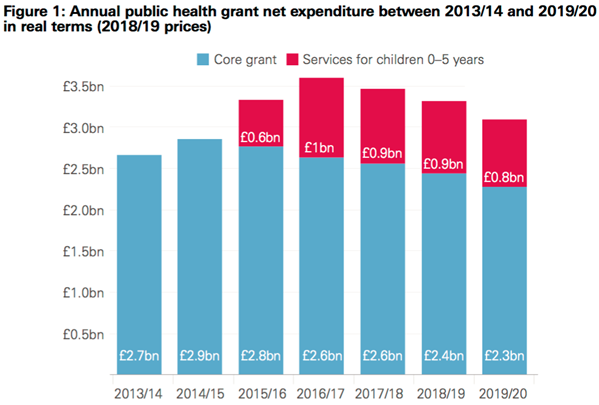Councils underfunded on public health by £3.2bn a year, study finds
Gabriella Jozwiak
Wednesday, October 24, 2018
An additional £3.2bn a year is required to reverse the impact of government cuts to the public health grant, which includes spending on health visitors and children's health services, and ensure that it is re-allocated according to need, a study has found.

Research by the Health Foundation shows the value of the core public health grant has dropped each year since being redirected to local authorities in 2014/15, and is set to fall further in 2019/20. The total fall in spend per person between 2014/15 and 2019/20 is expected to reach 23.5 per cent.
Meanwhile, funding for services for children 0-5 years of age - largely spent on health visitors for infants and mothers - has also fallen.
That portion of the grant, which transferred from the NHS to local authorities partway through the 2015/16 financial year, increased in real terms from £0.6bn to £1bn in the first full year of allocation (2016/17), but by 2019/20 it is set to fall to £0.8bn.
"Simply reversing funding cuts will not be sufficient," the report states.
"Demand for children's services can be expected to increase, with projected increases in the child population and the level of child poverty".

The Health Foundation has calculated that an additional £3.2bn a year is needed to make up the real terms fall in the public health funding, as well as changes to the cost of service provision since 2014/15.
The figure also takes into account current and future demand levels for services based on population levels and changes in levels of economic disadvantage. The child population in England is projected to grow by seven per cent between 2014 and 2019, placing increasing pressure on child health services.
Last month the Institute of Health Visiting warned that local authority cuts to public health budgets were causing health visitors to leave the profession, as they were concerned about the level of safeguarding they were able to provide as a result of strained resources.
Figures published recently by Labour suggest the overall number of health visitors in England fell by 678 between June 2017 and June 2018. The number had peaked at 10,309 in October 2015, but by June this year it had dropped to 7,912.
- Poverty, cuts and policy failures take toll on children's health
- Health visitors: five key changes
- Experts look to public health model to tackle surge in youth knife crime
Jo Bibby, director of health at the Health Foundation, said: "While the Health Secretary has rightly identified prevention as one of his three key priorities, the sustained cuts to the public health grant - a vital means of support for local authorities to tackle the causes of ill health - clearly run counter to this.
"At a time of ongoing wider cuts to public services that directly impact on people's health, and with the NHS under intense pressure, the cuts to the public health grant are short-sighted and irresponsible.
"The long-term consequences of eroding people's health are likely to prove far more costly than the short-term savings made.
"Five years since the NHS Five Year Forward View called for a radical upgrade in prevention, and with austerity said to be at an end, it is clear that if the government is serious about protecting and improving health, this rhetoric needs to translate into action.
"That should start by addressing the lack of investment in the public health grant in the forthcoming Budget and following Spending Review."
Ian Hudspeth chair of the community wellbeing board at the Local Government Association has urged the government to reverse reductions to councils' public health budgets and give local authorities more funding to further their "cost-effective work".
"Any extra funding for the NHS should also include public health funding for councils as the two are so intrinsically linked," he said.
"Early intervention and prevention work by councils to tackle teenage pregnancy, child obesity, physical inactivity, sexually transmitted infections and substance misuse, is vital to improve the public's health.
"Despite budget reductions, councils are determined to maintain vital public health services to help people live longer, healthier and happier lives, but the reality is that many local authorities are having to make difficult decisions on these key services, including stopping them altogether."
Royal College of Paediatrics and Child Health president Russell Viner said public health services play "a vital role in promoting healthy lifestyles and preventing children from becoming unwell".
"Government has shown commitment to tackling urgent public health issues affecting children such as obesity and mental ill health, but without adequate funding for services we will fail to see meaningful improvement in the long run," he said.




